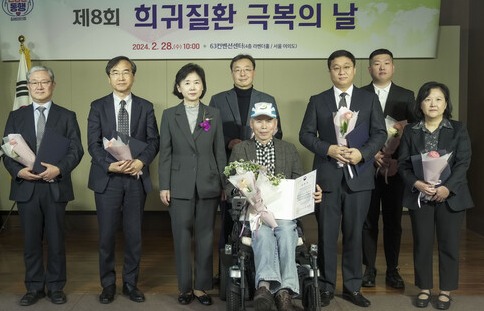Marking Rare Disease Day on Feb. 29, the Korea Disease Control and Prevention Agency (KDCA) held its 8th Rare Disease Day commemorative event on Wednesday to enhance public awareness of rare diseases and to encourage the determination of rare disease patients and their families to overcome illnesses.
Significant changes have been observed, particularly with specialized medical professionals actively engaging in research and treatment to improve the treatment environment for rare disease patients.
At the event, KDCA Commissioner Jee Young-mee gave commendations to seven medical professionals who contributed to improving the treatment environment for rare disease patients.

Professor Kang Seong-woong at Gangnam Severance Hospital was recognized for his efforts in systematizing rehabilitative treatments such as respiratory rehabilitation for patients with progressive neuromuscular rare disease, thereby contributing to extending patients' lifespan and improving their quality of life.
Professor Jeong Dae-chul at Seoul St. Mary's Hospital was commended for his dedication to the treatment and research of rare diseases such as pediatric rheumatic diseases and congenital immunodeficiency diseases, as well as his passionate contributions to national policies such as the domestic rare disease registration program.
Professor Kang Yun-koo at Wonju Severance Christian Hospital was selected as a recipient for his pioneering operation of the first diabetic clinic in Korea and relentless efforts in research and communication with diabetic patients, thereby altering patients' treatment outcomes and contributing to healthy living.
Professor Kwon Soon-hak at Chilgok National University Hospital was acknowledged for his leadership role in establishing a rare disease center in the Daegu-Gyeongbuk region, leading paradigm shifts in rare disease system construction.
Professor Cha Dong-hyun at CHA Gangnam Medical Center was commended for his activities in rare disease-related academic societies, educational programs, and prenatal diagnosis roles.
Professor Shin Young-rim at Soonchunhyang University Bucheon Hospital was awarded for her specialized treatment of rare disease patients and her research on diagnostic, treatment, and management systems.
Professor Lee Bong-gun at Hanyang University Medical Center was honored for his diligent contributions to rare disease specialist committees, serving as a member and chairman.
At the event, Lee Ji-won, director of the Rare Disease Management Division at the KDCA, spoke on the revised rare disease policy in Korea.
Following the revision of the Rare Disease Management Act in December last year, the agency has established a stable operational and support expansion base through a restructuring of the funding system among the national government, local governments, and the National Health Insurance Service (NHIS) for medical expenses for rare disease patients. As a result, the number of beneficiaries for medical expense support has increased from 1,165 last year to 1,248 this year, with 83 more diseases added.
Additionally, the number of diseases eligible for special food support, which was previously 28, has increased to 37, including the newly established program to support cornstarch for diabetic children. Furthermore, the KDCA is implementing various initiatives to strengthen the regional rare disease treatment support system by designating a total of 17 regional rare disease specialist institutions this year.
KDCA Commissioner Jee said, "We will continue to expand initiatives to improve the quality of life for rare disease patients and their families this year" and "will strive to open various channels of communication and encourage each other to contribute to overcoming rare diseases."

